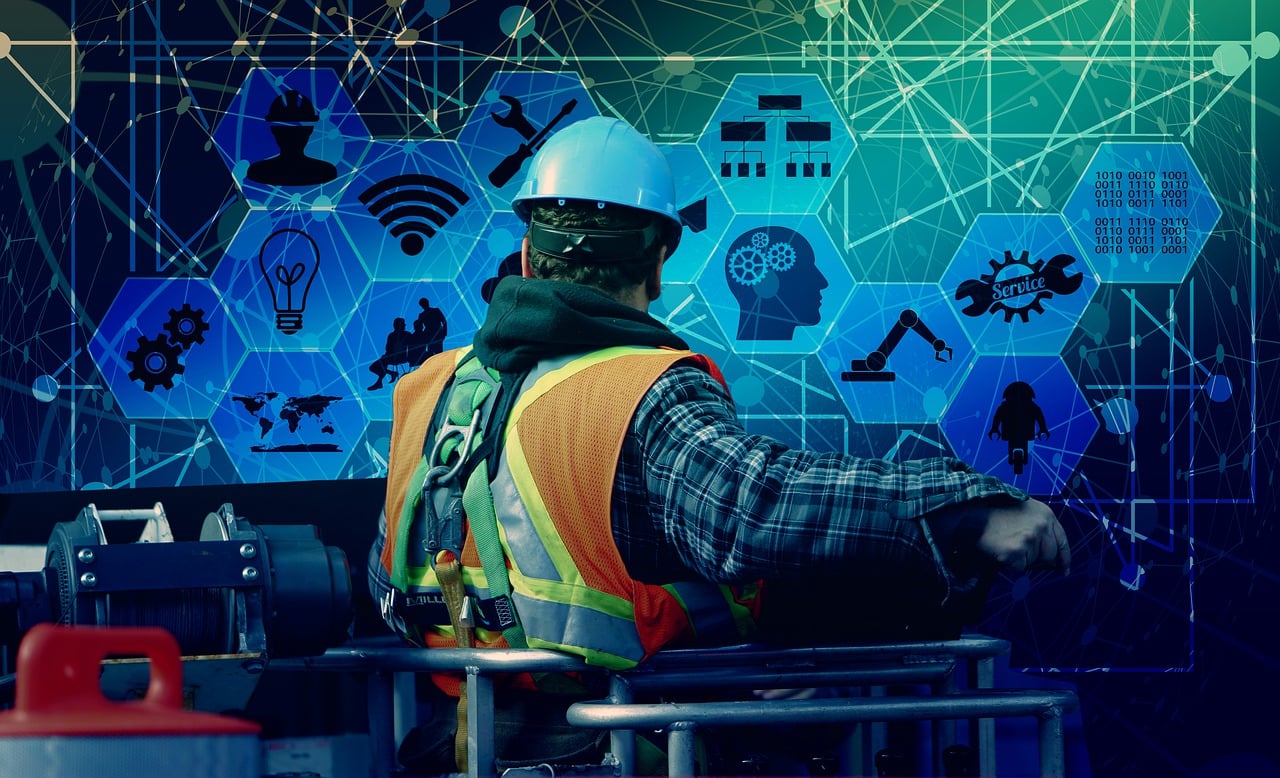4 Common Misconceptions About AI
Artificial intelligence (AI) is reshaping industrial operations—enhancing efficiency, quality, safety, and cost-effectiveness across sectors. Yet, despite its growing adoption, several persistent AI misconceptions continue to prevent many organizations from realizing its full potential.
This article addresses four common misconceptions about AI and clarifies what businesses—especially small and medium-sized enterprises (SMEs)—should really expect when adopting AI technologies.
Misconception 1: AI Will Replace Workers
One of the most persistent misconceptions about AI is that it will replace workers entirely. In reality, AI’s greatest value lies in augmenting human capabilities, not replacing them.
AI systems handle repetitive or data-intensive tasks, allowing workers to focus on higher-value activities that require creativity, critical thinking, and strategic decision-making. For example, AI can analyze large datasets faster and more accurately than humans, helping teams make informed decisions and optimize processes.
Rather than eliminating jobs, AI creates opportunities for more meaningful work—enhancing both productivity and job satisfaction.
Misconception 2: AI Is Too Expensive
A common belief is that AI solutions are prohibitively costly. While there is an upfront investment, AI should be seen as a strategic investment rather than just an expense.
The real value of AI comes from ROI: time saved, efficiency gains, reduced material waste, and improved product quality can quickly offset initial costs. Careful planning and scaling AI usage according to operational needs allow businesses to manage costs effectively while maximizing benefits.
Enterprise industries such as semiconductors, automotive, pharmaceuticals, and logistics, which were early adopters of industrial AI technology, are already leveraging AI to streamline operations and enhance performance, demonstrating the potential ROI for other sectors. Even for SMEs, targeted AI applications can deliver measurable returns within months, making adoption both practical and cost-effective.
Misconception 3: AI Is Only for Large Enterprises
AI is no longer reserved for companies with vast budgets or in-house data science teams. Small and medium-sized businesses often stand to benefit the most from AI’s efficiency gains.
For example, AI-based quality inspection systems can detect product defects in real time, reducing rework and material waste. Predictive analytics tools can also identify trends or anomalies that signal potential issues before they escalate.
Integrating AI into production or operational workflows allows SMEs to streamline processes, improve output consistency, and strengthen competitiveness—all without extensive infrastructure investments.
Misconception 4: AI Is Difficult to Implement
Implementing AI can seem daunting, but modern solutions are designed with usability in mind. The latest AI vision systems are easily integrated into existing production environments and are designed to be compatible with existing systems and hardware, often requiring minimal training.
Specialized industrial AI providers also offer end-to-end support—from initial assessment to deployment and optimization—ensuring a smooth adoption process. While a degree of planning and adaptation is necessary, implementing AI is increasingly straightforward, even for smaller organizations with limited technical resources.
Summary: Rethinking AI Adoption
AI is not an abstract or inaccessible technology—it’s a practical tool that empowers companies of all sizes to improve performance, safety, and decision-making.
Dispelling these common misconceptions helps organizations approach AI adoption with confidence and a clearer understanding of its value. Whether used for automating routine tasks or enhancing worker expertise, AI is becoming an essential enabler of innovation, operational excellence, and measurable efficiency gains across industries.

Industrial AI FAQs
What is industrial AI?
Industrial AI is the application of artificial intelligence to industrial operations to enhance efficiency, productivity, quality control, safety, and forecasting. It helps organizations optimize processes, reduce downtime, and make data-driven decisions.
How does industrial AI work?
Industrial AI works by leveraging machine learning and other AI technologies to analyze data from sensors and systems. It detects patterns and anomalies, providing insights that help optimize operations, improve performance, and reduce risks.
What are some examples of industrial AI applications?
Examples of industrial AI applications include:
- Quality control: ensures product consistency.
- Anomaly detection: identifies issues early.
- SOP compliance: ensures standard operating procedures are followed.
- Safety inspection: detects potential hazards and supports workplace safety.
How can industrial AI be integrated into existing systems?
Industrial AI can be integrated into existing systems using software and hardware designed for industrial environments. Some of the latest AI solutions are compatible with current systems and can be customized to meet the specific needs of each organization, enabling improvements without major disruptions.
How can industrial AI help reduce downtime?
Industrial AI predicts equipment failures before they occur, enabling preventive maintenance, optimizing maintenance schedules, and improving equipment reliability to minimize operational disruptions.
How can industrial AI improve operational efficiency?
Industrial AI improves operational efficiency by providing real-time insights into production, equipment performance, and workflow processes. This allows companies to optimize operations, reduce waste, and maintain consistent output.
How can industrial AI improve workplace safety?
Industrial AI improves workplace safety by analyzing data to identify potential hazards and provide early warnings. This allows companies to take proactive measures, reduce accidents, and create a safer environment for workers.
Is industrial AI expensive to implement?
The cost of implementing industrial AI varies depending on project size and complexity. Initial investments may be required for software, hardware, and integration, but the long-term benefits—such as improved efficiency, reduced downtime, and operational gains—often outweigh these costs, making AI a practical investment for companies of all sizes.